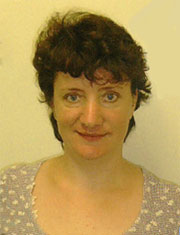Awareness of learning and learning patterns.
It is not unusual to see low-level ESL students asking their peers (whom they perceive as having greater proficiency in English) about issues related to their own language learning: how much English they learned in their country, how long they have been in class here, how long they have lived here. In this way, students can understand their own progress in learning English in comparison to their peers.
In this first excerpt, from before the first class period of summer term, 2003, a ‘level B' class, Sangwan comes into the class and greets Larissa. When Sangwan expresses surprise that Larissa has remained in the ‘level B' class, Larissa displays to Sangwan that she could be in a higher level, saying that the teacher has invited her to attend a higher level class (‘level D'). She also displays her lack of confidence in her own abilities in English indicating that she refused the promotion, preferring to remain in ‘level B' (Click to View) (Requires Internet Explorer).
In the following excerpt, from the same class, Larissa checks with peers about their previous English language education. In the first (Click to View) (Requires Internet Explorer), just after the completion of a task, Larissa asks her peer "How long study English PCC [Portland Community College]?". In the second, again at the end of a language- learning task, Larissa asks a peer "You study English in your country"? When her peer replies in the affirmative, Larissa, expressing envy, responds saying "easy" with a laugh.(Click to View) (Requires Internet Explorer)
At home, Larissa gauges herself against her husband's language learning.
| Larissa: | Yes, as soon as we got here, he got a job at an American company. He is the only Russian there. At first, he would get up every day an hour early and study English very hard. Also, at the very beginning he would explain many things using signs or drawings. And, in about 6 months we didn't need a translator anymore. So now if somebody asks in English how we spent the weekend, he can answer without problems… I can say "Yes" or "No" or simple phrases like asking for water or tea. Or, if doctors say something about my child's disease, I can understand. But my husband can have a conversation on any topic. It's simple for him. | |
| Hide Conversation | ||
She also comments on how when using English with her daughter helping her with homework, it is like she is also ‘starting over', in first grade with her daughter.
| Larissa: | I use English more, since now my child has to do her homework and read books. So, I have to spend more time studying English myself in order to help her. When we're reading in English, I'd stop and say [in Russian] "What is the bunny doing?" She would explain it to me. I don't understand that as well as she does. Or, when I read directions for homework, I would ask her "Did you understand?" She says "Yes, I understood everything." | |
| IR: | What grade is she in? | |
| Larissa: | First | |
| IR: | First grade. Everything in English | |
| Larissa: | Yes, in English. | |
| IR: | that makes sense, yes | |
| Larissa: | It seems like she started the 1st grade and I started studying in the 1st grade as well. | |
| IR: | mm hm ((laughs)) | |
| Hide Conversation | ||
